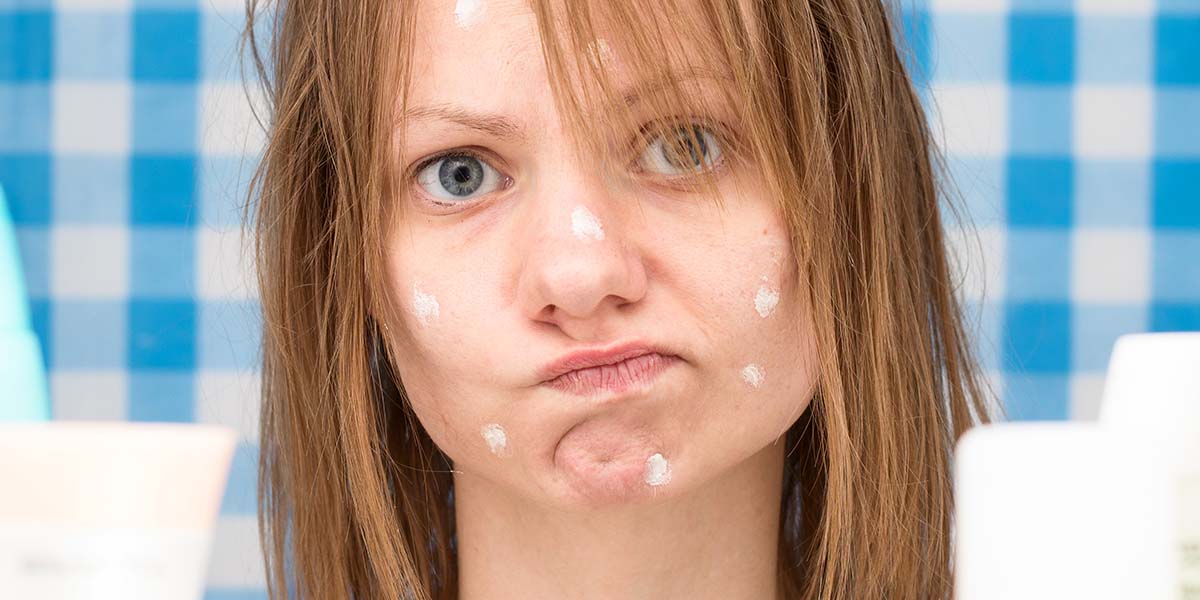If you suffer from acne, it’s likely you’ve been given tons of advice on what to do and what not to do to help your skin condition. Unfortunately, in some cases, the advice you receive can be more harmful than helpful and exacerbate the problem.
One big contradiction is whether you should dry out your pimples or continue to hydrate your skin using moisturizers and serums. There is a never-ending stream of literature on the web advising people to ‘dry out your pimples overnight’. Some articles recommend using a dab of toothpaste on your spots, others encourage people to use a chemical mask or ingredients designed to have a drying effect on the skin.

If you’ve ever tried these techniques, you will know that drying out your skin not only doesn’t get rid of pimples, but it can make your skin inflamed and feeling a whole lot worse. If you haven’t tried these techniques, we recommend you don’t start.
In this blog, we explore why drying out your skin can be problematic for acne, and what techniques are more helpful.
What is Acne?
Acne affects up to 85% of Australian’s at some stage of their life. It occurs when hair follicles become clogged with oil and dead skin cells and results in whiteheads, blackheads or pimples appearing on the face, chest, upper back and shoulders. People with an oily skin type tend to be more prone to acne as they produce more sebum than needed. This over supply of oil flows from inside the epidermis to the skins surface and can get blocked in hair follicles.
Acne can be triggered by several factors such as diet, lifestyle, stress, hormones and certain medications.

Why Drying Out the Skin Doesn’t Work?
Your skin is healthiest when it is hydrated and well nourished. Drying out your skin does not help with any skin condition and will certainly not get rid of acne. Dry skin is actually irritated skin and irritation heightens the risk of getting more acne. It can also lead to flakiness, tightness and being prone to fine lines and scaly patches.
If you have acne it is best to AVOID the following practices:
Dabbing on toothpaste
Toothpaste has been developed to use on your teeth not your delicate skin. Therefore, the formulation may be too strong for your skin and upset your pH levels. Two ingredients that can be particularly problematic are baking soda which may lead to rashes or burning, and sodium lauryl sulfate which can irritate sensitive skin.
Using drying ingredients
Products that contain high levels of salicylic acid, benzoyl peroxide, sulfur, activated charcoal and certain alcohols (ethanol, methanol, benzyl, denatured or isopropyl) are best avoided. The issue can be that these ingredients break down the skin's natural barriers and can lead to dryness and irritation.
Whilst most alcohol-based products can cause issues, cetyl alcohol is an exception. You may find this listed on products as hexadecan-1-ol or palmityl alcohol. This fatty alcohol is often as an emulsifier, emollient or thickener and can help to soften and smooth skin. It is not known to cause irritation.
Over-washing
Avoid washing your face several times a day as this can irritate your skin, leading to more breakouts. Stick to washing your face when you wake up, before you go to bed and if you have a sweaty workout.
For people with acne prone skin, it can be beneficial to keep washing your face to a minimum, using water and gentle cleansers.
Scrubbing
Whilst you might be tempted to scrub or exfoliate your skin to feel clean, don’t use abrasive products or techniques. Harsh scrubbing can trigger irritation, so if you do want to exfoliate, opt for a gentle chemical product.
Sleeping in makeup
Removing your makeup before bed is important. If you leave it on you may suffer from clogged pores which can quickly lead to breakouts. Even non-comedogenic makeup can cause acne if you sleep in it.

What can Help Your Acne?
Choose products that nurture your skin
If you suffer from acne, it is best to choose gentle products that don’t dry out your skin.
AMPERNA® products can help acne through the power of probiotics. Probiotics work in a similar way to antibiotics in the treatment of acne, with the advantage of not killing off the “good bacteria”. When applied directly to the skin they create a “bacterial interference" and their antimicrobial properties mean they can kill bad bacteria that is responsible for triggering inflammation.
AMPERNA®'s Acne Trio has been specifically developed to help with this skin condition:
- AMPERNA® Ultra Gentle Soothing Cleanser is a light gel cleanser that helps remove makeup while balancing the skin.
- AMPERNA® Lightweight Soothing+ Emulsion contains a groundbreaking probiotic formula, along with ceramides, hyaluronic acid and emollients to help nourish the skin and protect it from free radical damage.
- AMPERNA 10% Pro+ Resurfacing Lotion contains 10% glycolic acid (AHA) and antioxidants to help calm redness and improve the skin’s texture
Adjust your lifestyle
In addition to your skin care products, good habits that support healthy skin for acne sufferers should be adopted:
- Drinking plenty of water
- Eating a balanced diet and limiting alcohol consumption
- Regular exercise
- Plenty of rest and seven to eight hours of sleep each night.
- Mindfulness techniques such as breathing, yoga and meditation
- Being mindful about topical treatments you are using such as steroids
I can help you adjust your lifestyle in order to best look after your skin health. The AMPERNA® Holistic Skin Coaching Service launched in 2019 and allows people to discuss their skin condition and lifestyle in detail and I help you develop a tailored plan to work towards healthy glowing skin. We offer a telehealth service and you can book in for a consultation here.
Sources:
https://www.elle.com/beauty/makeup-skin-care/a27506591/how-to-get-rid-pimples-overnight-fast
https://www.wellandgood.com/using-moisturizer-on-acne/
https://www.insider.com/acne-mistakes-making-it-worse-2018-5
https://www.bustle.com/articles/156994-how-to-dry-out-pimples-overnight-for-clear-skin-by-morning


















